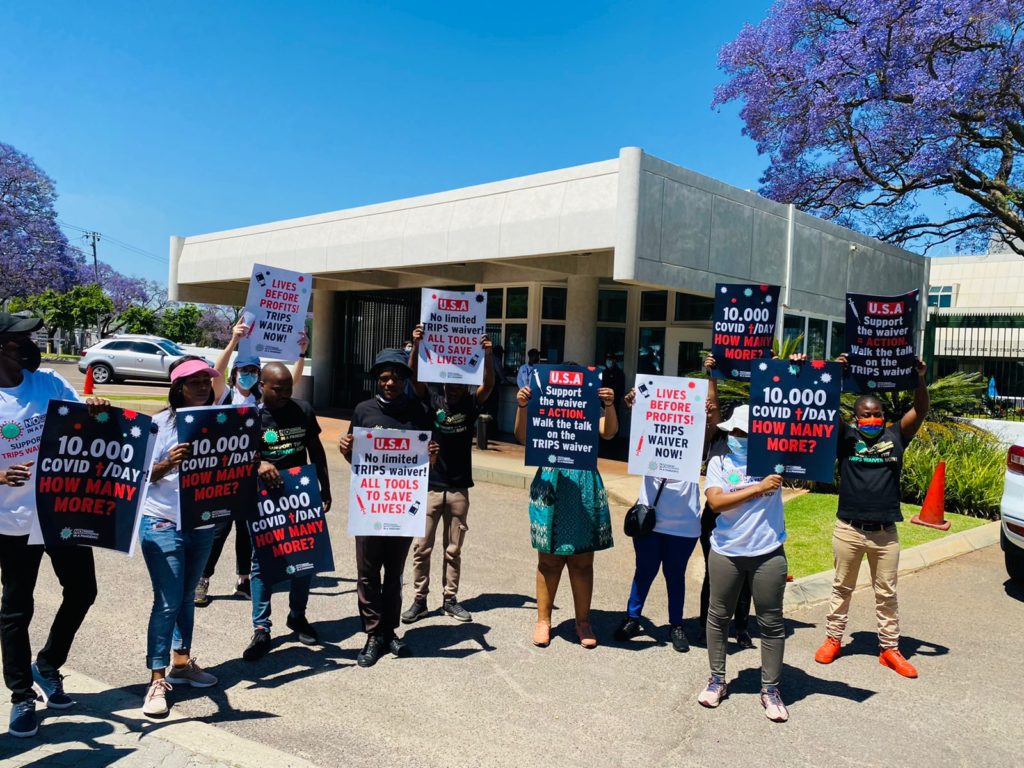Several activist organisations protested outside of the Belgian, Dutch and American embassies in South Africa, calling for a fast-tracked process to temporarily lift patents for coronavirus vaccines, tests and treatments.
One year ago both South Africa and India tabled a proposal to World Trade Organisation (WTO) to waive the IP protections — including patents, industrial designs, copyrights, and undisclosed information — guarded by the WTO’s Trade-Related Aspects of Intellectual Property Rights (TRIPS) agreement, for at least three years.
According to Doctors Without Borders (MSF), this is an important step for equal access to vaccines and other medical tools across the world, especially in developing countries. But although several Belgian politicians have shown support for this proposal, Belgium as a whole is against it.
"We are tired of the fact that this proposal is deliberately being blocked at the WTO, and the fact that the Belgian government is playing a role in this by not supporting it either," Dimitri Eynikel, MSF Policy Team Co-Coordinator & EU Advisor, told The Brussels Times.
Related News
- Europe appeals to the US to 'open the market' for vaccines
- European Commission defends compulsory licences over patent removal
Although more than 100 countries and the European Parliament have since said they are in favour of temporarily altering the agreement for the pandemic, which since 1995 has set the minimum standard of protection of copyright, trademarks, and geographical indications, no progress has been made, Eynikel stressed.
The result can be seen in global vaccinations figures. So far, around 77% of the 6.41 billion vaccine doses that have been administered across the world have gone to people in high- and upper-middle-income countries, which have now also started administering booster doses.
To put this into context, while around 17% of South Africa's population has been fully vaccinated, in Belgium, around 73% of its total population is fully protected. It has also administered around 275,000 booster doses to certain vulnerable groups.
Speed up negotiations
With Tuesday's protests, various South African organisations, as well as MSF, want to draw attention to this inequality in vaccine coverage rates and to urge the Belgian government to fast-track the negotiations on the TRIPS waiver, which would also cover the new Covid-19 drugs that are being tested, and could be produced in low- and middle-income countries.
"It is crystal clear that unless legal tools like the TRIPS Waiver are adopted, many countries will continue to be at the mercy of patent-holding corporations that have the say over who gets to produce, who gets to buy, and at what price, while health ministries are already reeling from the rising costs of tackling COVID-19," said Felipe Carvalho, MSF Access Campaign Coordinator in Brazil.
This week, the experts in the WTO's TRIPS Council will hold technical discussions, which could result in the proposal going to the WTO's Ministerial Conference at the end of November.
"But we know this process has been completely stuck for a year because especially the European Commission and several European countries are completely obstructing this, and do not want a solution, which is completely unacceptable, especially because this conference only takes place once every two years," said Eynikel.
"We cannot let the current momentum and this chance pass us by completely and end up with no outcome at this conference, especially if just a few countries are opposing something that is clearly in high demand," he added.

